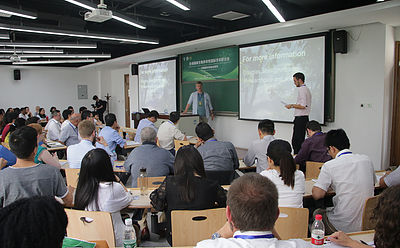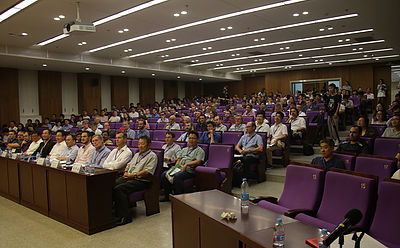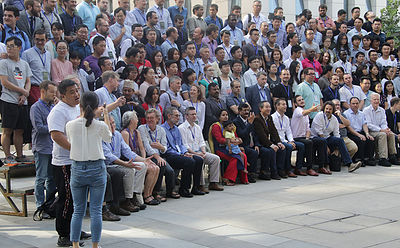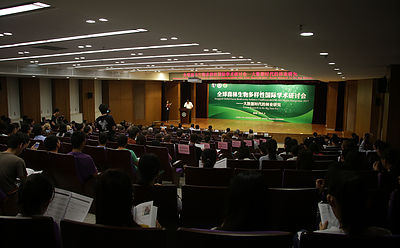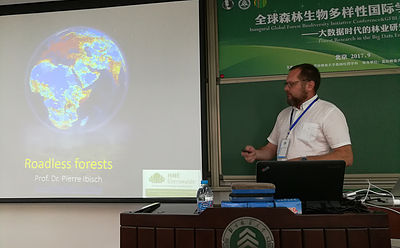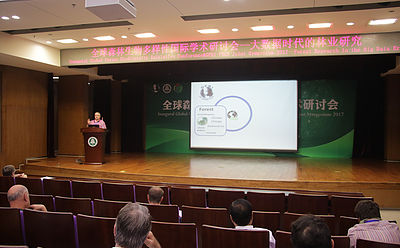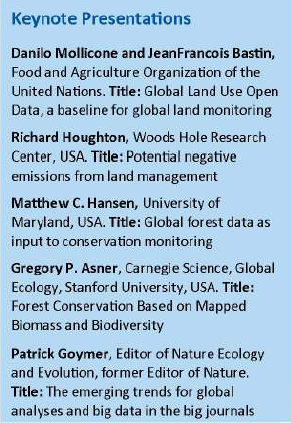Inaugural Global Forest Biodiversity Initiative Conference & GFBI-FECS Joint Symposium 2017
Forest Research in the Big Data Era
September 6-9, 2017 Beijing, China
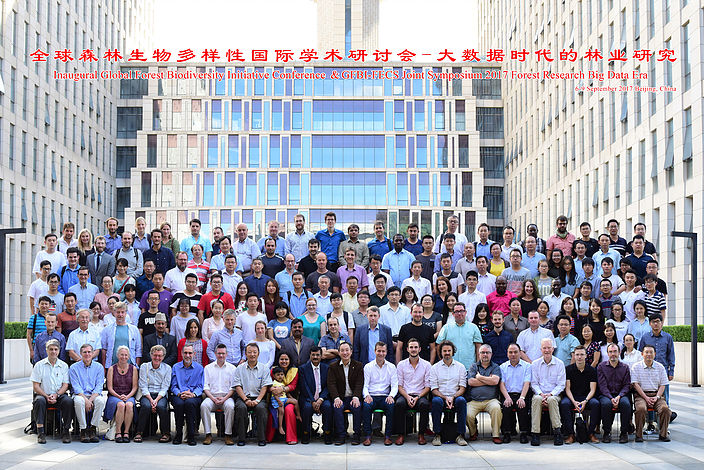
Conference memos
The Inaugural GFBI Conference took place in Beijing, September 6-9, 2017.
The conference was attended by over 70 participants from 33 countries. Staff members from Beijing Forestry University, together with more than 40 student volunteers provided valuable service to ensure the success of the conference.
Presentations
Plenary Sessions
Liang, Nabuurs, Crowther
Klaus von Gadow
Alberto Sorribas
Richard Houghton
Negative emissions in managed and unmanaged forests
Jean-Francois Bastin
Towards global land use open data- a baseline for global land monitoring
Patrick Goymer
Concurrent Sessions A0102
Elena Tikhonova
Tree diversity patterns along the latitudinal gradient in the Northwestern Russia
Susan Wiser
Laura Zeller
Alexander C. Vibrans
Krzysztof Stereńczak
Forest monitoring – landscape scale at the single tree level
Pascal A. Niklaus
JAVIER GARCÍA PÉREZ (GAMARRA)
THE USE OF GLOBAL BIODIVERSITY DATABASES TO INCREASE TAXONOMIC QUALITY IN FOREST INVENTORIES
Henrik Hartmann
Global trends in tree mortality as indicator of forest health
Heinz Gallaun
M L Khan
Plant diversity patterns and conservation status of Eastern Himalayan forests in Arunachal Pradesh
Dmitry Schepaschenko
Forest-Observation-System.net – a global in-situ forest biomass data repository
Hans Pretzsch
The effect of species mixing on tree and stand growth. Review and perspectives
Amit Kumar
Sergio de Miguel
LiDAR as a bigdata source to improve the assessment of forest resources in NFM
David Coomes
Variation in the processes structuring forests, assessed by airborne remote sensing
Tommaso Jucker
Topography shapes the diversity, structure and carbon content of tropical forest landscapes
Concurrent Sessions A0202
Yude Pan
Forest Biodiversity, Structure Complexity and Resilience
Laura Duncanson
Comparison of Empirical Modeling Approaches for Modeling Forest Biomass with NASA’s GEDI Mission
Miho Morimoto
Pierre Ibisch
Felix Finkbeiner
Andrew R. Marshall
USING BIG DATA TO PREDICT RESTORATION POTENTIAL
Jingyun Fang, Zhiheng Wang
Structural characteristics of forests in China based on PKU-PSD project
Filippo Bussotti
Douglas Sheil
How trees water our planet: forests, rain and the future
Liu Yong
Introduction on Forestry in China
Xiangdong Lei
Sophan Chhin
Eric B. Searle and Han Y.H. Chen
Tilak Jang Khadka
Minjee Park
Growth pattern analysis of Korean tree species using national forest inventory data
Philip Crim
Eric B. Searle
Concurrent Sessions A0302
Marion Pfeifer
Tropical forest canopies and their relationships with climate (and disturbance)
Lushuang Gao
Purabi Saikia
Diversity and Dominance of a Tropical Moist Deciduous Forests of Ranchi, Jharkhand, Eastern India
Camille Piponiot
Towards a new selective logging strategy? The importance of diversifying commercial species
Sebastian Pfautsch
Challenges for Sustainable Forest Management through Urbanization
J. Javier Corral Rivas
Mexican network of permanent sample plots for monitoring forest growth and change: first results
Bruno Herault
Key drivers of post-disturbance forest recovery lessons from the Paracou experiment
Michael Ngugi
John Neldner
Song, XY., Cao, M.
Francesco Boscutti
Traditional forest management and biodiversity in a lowland wood remnant in North-East Italy
Jinghui Meng
It is our great pleasure to announce the Inaugural GFBI Conference & Joint GFBI-FECS Symposium, to be held in Beijing, China, on September 6-9, 2017.
Forests are critical in the fight against biodiversity loss and climate change. But successful policy to govern these valuable resources necessitates a fundamental understanding of forests at a global scale. Until now, the required large-scale understanding of forest ecosystems has been based on remote sensing data. We can now supplement this information with massive ground-sourced inventory data at a global scale, which will greatly enhance our understanding of forest dynamics in a global context.
The GFBI is a global research network focused on the use of big data to enhance our fundamental understanding of the global forest system. We would like to invite you to join us in our first conference in Beijing in September 2017, which will bring together experts from around the world that are focused on the use of “big data” to understand forest systems. By combining our expertise and knowledge on a range of approaches, we hope that this conference can serve as a platform to strengthen the connections within this vibrant research community.
The Conference features: a) Opportunities to develop research collaboration with current and prospective GFBI members from around the world; b) Development of GFBI legislation and data-sharing protocols; c) Plenary and Concurrent sessions of top-tier research presentations (we accept papers/presentations from any discipline that can provide interesting contributions about the structure and dynamics of forest ecosystems, and their services to people); d) Guest speakers from UN FAO, Nature editorial board, and research institutes, etc. (the list to be confirmed in January);
Please visit our conference website http://gfbifecs.csp.escience.cn and the GFBI webpagehttp://www.gfbinitiative.org/symposium2017 for details about registration, accommodation, and conference venues, travel documentation and updates.
Please do not hesitate to let us know if you have any questions or suggestions. We look forward to welcoming you at this conference.
Organised by
The Global Forest Biodiversity Initiative (GFBI), USA Beijing Forestry University, China
Sponsored by
Beijing Forestry University, China Forest Ecosystems Editorial Office, China
Conference Chairs
Jingjing Liang, West Virginia University, US
Thomas Crowther, NIOO-KNAW, NL
Gert-Jan Nabuurs, Wageningen University and Research, NL
Klaus v. Gadow, University of Göttingen, DE
Conference Secretariat
Xiuhai Zhao, Beijing Forestry University, CN
Benefits to participate in this Conference The sponsor of this conference offers all the participants the following benefits: – Abundant Travel awards which cover the following expenses Symposium registration; Tours in Beijing (the Great Wall and/or Forbidden City); Hotel lodging throughout the symposium; Breakfast, lunch, and dinner banquet every night; Airport pick-up and drop-off, and local commute. – A special issue of Forest Ecosystems will be dedicated to the proceedings of this Conference. All the Travel Award Receivers must submit their abstracts and manuscripts by the deadline dates. – Best papers from this Conference will receive cash awards of US$500 each, up to a total of 16 awards Benefits to publishing in Forest Ecosystems Forest Ecosystems (ISSN 2095-6355, eISSN 2197-5620) is an international Open Access journal publishing scientific communications about the structure and dynamics of “natural” and “domesticated” forest ecosystems, and their services to people. – The publication costs ( EUR1000) are waved and covered by Beijing Forestry University, the sponsor of this conference. – High visibility Forest Ecosystems’s open access policy allows maximum visibility of articles as they are available to a global audience. – Speed of publication Forest Ecosystems offers a fast publication schedule whilst maintaining rigorous peer review; Articles will be published with their final citation after acceptance; the article will then be available through Forest Ecosystems and SpringerOpen. – Copyright Authors of articles retain the copyright of their articles and are free to reproduce and disseminate their work.
Registration & Submission
Abstract due: February 28, 2017
Registration due: August 1, 2017
Manuscript due: August 1, 2017

